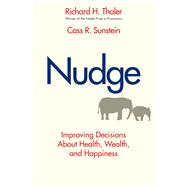
Note: Supplemental materials are not guaranteed with Rental or Used book purchases.
Purchase Benefits
What is included with this book?
| Acknowledgments | p. ix |
| Introduction | p. 1 |
| Humans and Econs | |
| Biases and Blunders | p. 17 |
| Resisting Temptation | p. 40 |
| Following the Herd | p. 53 |
| When Do We Need a Nudge? | p. 72 |
| Choice Architecture | p. 81 |
| Money | |
| Save More Tomorrow | p. 103 |
| Naive Investing | p. 118 |
| Credit Markets | p. 132 |
| Privatizing Social Security: Smorgasbord Style | p. 145 |
| Health | |
| Prescription Drugs: Part D for Daunting | p. 159 |
| How to Increase Organ Donations | p. 175 |
| Saving the Planet | p. 183 |
| Freedom | |
| Improving School Choices | p. 199 |
| Should Patients Be Forced to Buy Lottery Tickets? | p. 207 |
| Privatizing Marriage | p. 215 |
| Extensions and Objections | |
| A Dozen Nudges | p. 229 |
| Objections | p. 236 |
| The Real Third Way | p. 252 |
| Notes | p. 255 |
| Bibliography | p. 263 |
| Index | p. 283 |
| Table of Contents provided by Ingram. All Rights Reserved. |
The New copy of this book will include any supplemental materials advertised. Please check the title of the book to determine if it should include any access cards, study guides, lab manuals, CDs, etc.
The Used, Rental and eBook copies of this book are not guaranteed to include any supplemental materials. Typically, only the book itself is included. This is true even if the title states it includes any access cards, study guides, lab manuals, CDs, etc.